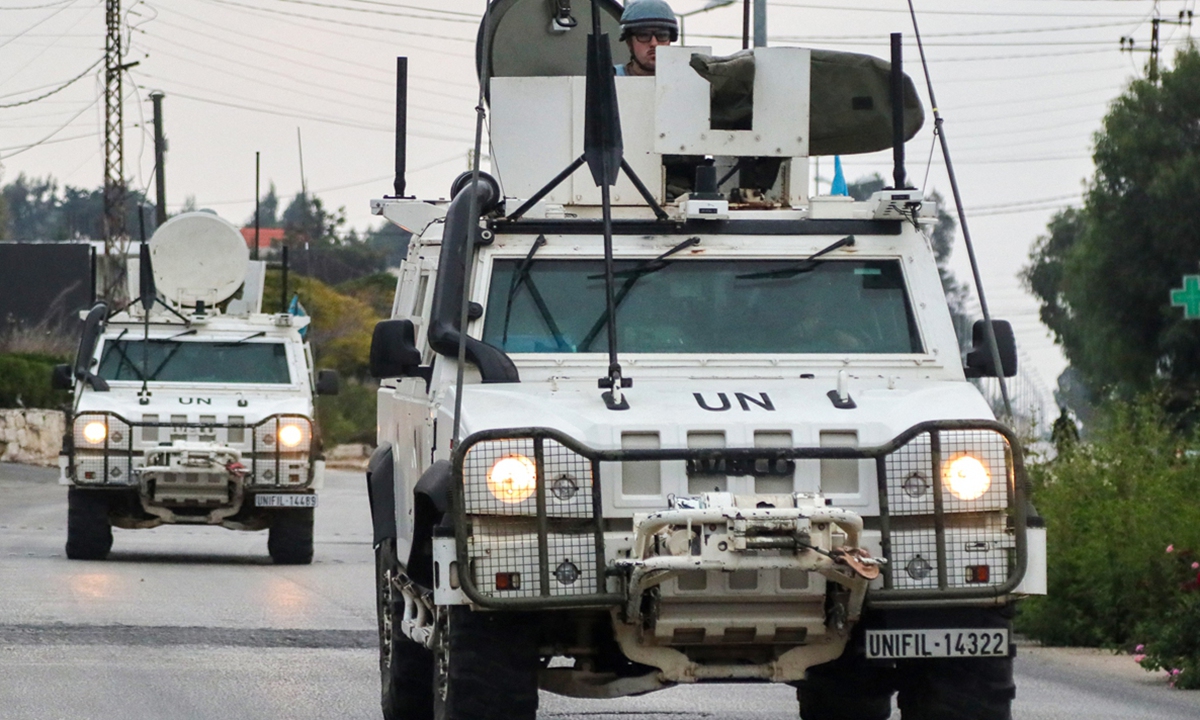
Vehicles of the United Nations Interim Force in Lebanon (UNIFIL) patrol in Marjeyoun in southern Lebanon on October 11, 2024, amid the ongoing conflict between Hezbollah and Israel. Photo: AFP
Following an incident in which two Israel Defense Forces (IDF) tanks broke through the gate and forcibly entered a UN Interim Force in Lebanon (UNIFIL) peacekeeping base on Sunday, UN Secretary-General Antonio Guterres issued a statement on the same day, warning, "Attacks against peacekeepers are in breach of international law, including international humanitarian law. They may constitute a war crime." The Israeli side defended themselves, claiming that to evacuate wounded IDF soldiers, "two tanks reversed in a spot where they couldn't have gone elsewhere because of the threat of fire."
Since the escalation of clashes between Israel and Lebanon, UNIFIL has come under frequent attacks. Multiple peacekeepers were injured, serving as further evidence that this escalating conflict is impacting regional order and the bottom line of international law. Concerns are growing that the situation in the Middle East will spiral further out of control.
Attacks on UN peacekeeping forces must be halted immediately. Peacekeepers are not conventional "forces" but operations authorized by the UN General Assembly or UN Security Council to carry out peacekeeping missions such as monitoring ceasefires, mediating conflicts, protecting civilians, and providing humanitarian aid. These actions are safeguarded by international law and their moral standing is widely respected by the international community. No country has the right to restrict peacekeepers' freedom of movement within their operational zones, let alone threaten their safety and security.
UNIFIL was established under UN Security Council Resolution 425 in 1978 and remains one of the longest-serving peacekeeping missions in the world. Following the conflict between Lebanon and Israel in August 2006, the UN Security Council passed Resolution 1701, expanding UNIFIL's mandate and increasing its personnel to maintain security in southern Lebanon. As of September 2, UNIFIL consists of over 10,000 troops from 50 countries, including 418 from China. UNIFIL's presence is vital to ensuring the implementation of the diplomatic solution outlined in Resolution 1701, which remains the only viable path to resolve the Israel-Lebanon conflict.
The attacks on UNIFIL send a dual warning signal. First, they show that certain countries or forces are challenging international law and the norms of international relations, further exacerbate the already tense situation in the Middle East. Second, these attacks represent a serious disruption to the UN peacekeeping operations in the region, potentially foreshadowing even more dangerous military escalations and raising further concerns within the international community about the future of conflict in the Middle East.
We have observed a rapidly forming consensus within the international community regarding the attacks on UNIFIL. France, Italy and Spain issued a joint statement to express their "outrage."
Following this, 40 UN member states that contribute peacekeepers to UNIFIL signed a joint declaration strongly condemning the recent assaults. The international community is united on this issue: The presence of UNIFIL must be respected, and all parties involved in the conflict have an obligation to ensure the safety of its personnel at all times while supporting peace and stability in Lebanon and the broader region. UNIFIL embodies the principles of international law and UN Security Council resolutions, and the actions of all parties must have clear boundaries; they cannot challenge the humanitarian and legal thresholds.
The humanitarian tragedy in Gaza is already severe, and allowing Lebanon to fall into a similar plight would pose a moral and ethical challenge for the international community. It is high time to collectively press the stop button on actions that openly provoke the authority of the UN, as well as international humanitarian law. While the consensus emerging within the international community is a positive step forward, it is not sufficient.
Some parties, emboldened by support from the US and others, continue to act with a misguided sense of impunity on this issue. We urge the need for broader international public pressure and diplomatic action, advocating for dialogue and consultation in multilateral and bilateral contexts, as well as within the UN Security Council and UN General Assembly, to develop impactful resolutions concerning the relevant parties.
Since the outbreak of the current Israel-Palestine conflict, UN's authority has faced numerous challenges, with its peacekeeping and humanitarian efforts being obstructed and the lives and property of personnel threatened. However, it is under these circumstances that the international community has come to recognize the importance and urgency of respecting UN's leadership and mission, as well as maintaining a multilateral cooperation framework centered around the UN. The joint open letter from over 100 countries of support and confidence in the US Secretary-General and his work serves as clear evidence of this. The challenges posed by the crisis remind the international community that the role of the UN must be strengthened, not weakened; its status must be upheld, not undermined.
Currently, achieving a ceasefire between Lebanon and Israel must be the top priority. The Middle East cannot afford a full-scale war, and the conflict must not continue to escalate. All parties must approach the current situation with a calm, rational and responsible attitude, making genuine efforts to break the vicious cycle of violence and refrain from actions that could drag the region into new catastrophes. The authority of the UN should be respected by all member states, and influential powers, in particular, should set an example.

